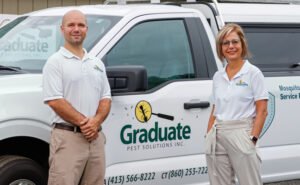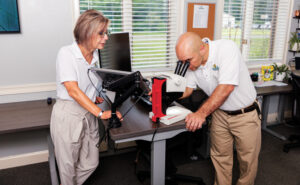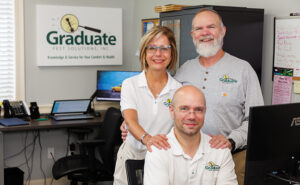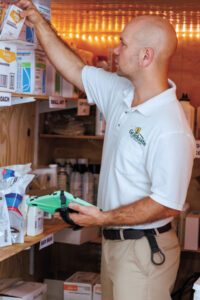
Paul and Brenda Olesuk see exclusion services as an extension of their green approach — and a major growth opportunity, too. (PHOTO: CHRIS MARION PHOTOGRAPHY)
Brenda and Paul Olesuk are the mother-son duo behind Graduate Pest Solutions (GPS), based in Hampden, Mass. Founded in 2007 by entomologist Glenn Olesuk — Brenda’s husband and Paul’s father, who is now retired — the company has grown significantly under Paul’s leadership in the past five years.
The company is about 65 percent residential and 35 percent commercial, and serves customers across Massachusetts and Connecticut. While GPS makes use of traditional pest management products and methods, the Olesuks note there is a growing demand for organic and alternative solutions. Paul points to two main reasons for the increase: logistics and an environmental mindset.

To make a green program work, the Olesuks say, it’s important to know the species, size and scope of the infestation to determine the right course of action. (PHOTO: CHRIS MARION PHOTOGRAPHY)
“The regulatory framework is becoming such that we can’t apply our traditional materials for mosquitoes and ticks near bodies of water, so we are using greener products just for that reason,” he explains. “There’s also increased customer demand in certain markets for us from pet owners, young families and older individuals with health concerns.”
For GPS, one growing market is slightly north of Hampden: the “Five College Consortium,” which comprises Amherst College, Hampshire College, Mount Holyoke College, Smith College and the University of Massachusetts Amherst. The region is home to about 30,000 students, along with faculty, staff and other residents and business owners.
Of course, there is still a market for traditional pest control, even in the Five College region, Paul points out. “The green program is extra work and extra cost,” he explains. “From what we’ve seen from marketing and in-person, customers generally know whether they want a green or traditional program from the first visit. Still, we always let them know both options exist. We also see people inquire about green, but when presented with the costs, decide to go traditional.”
Sharing industry knowledge

Glenn Olesuk is officially retired, but helps Brenda and Paul out in the office now and then. (PHOTO: CHRIS MARION PHOTOGRAPHY)
Paul teases he recalls “dragging hoses while in middle school” to help Glenn at pest control accounts. As a professional jazz trombonist by training who came back to the family business in 2019, Paul adds that he sees pest control as an “instrument” in which he continues to practice and improve.
Brenda had a career in organizational management and accounting before joining Glenn, who has been in the professional pest control industry since 1980, in building GPS. Today, she oversees GPS’ marketing efforts, which include a strong digital presence and educational content for customers via e-newsletters.
“We’ve noticed an increase in inquiries about appointments shortly after we send an e-newsletter,” Paul says. “Customers appreciate and
value the education we share with them.”
Brenda agrees, noting, “It helps us stand out from the competition.”

“All of our techs are trained on green strategies, because customers should know about all their options,” says Paul Olesuk. (PHOTO: CHRIS MARION PHOTOGRAPHY)
To build upon their digital marketing momentum, the Olesuks recently signed onto a premium level of HubSpot to enhance marketing, sales and customer service. They also are exploring TV commercials to reinforce the GPS brand.
Ready for what’s next
GPS currently employs seven technicians, all licensed applicators who are universally trained on all methods and accounts. This fall, the Olesuks are experimenting with two commercial-only routes to optimize their team’s schedules. Once that is running smoothly, the next goal is to build an in-house exclusion division to enhance GPS’ green approach.
“We see an opportunity for our future to focus on exclusion, which aligns with our green approach,” Brenda says. “We have a handyman partner for that currently, but as we grow, it’s becoming evident that just like we’re allocating resources for commercial routes, we’ll eventually need dedicated people, equipment and vehicles just for exclusion work.”
Despite the challenges of offering green pest control solutions, including higher costs and the need for specialized knowledge, the Olesuks remain positive about the future of environmentally friendly pest management. They view it as an important service that will continue to grow not only based on customer demand, but on staying ahead of the regulatory curve for greener solutions.
“Our technicians come from construction and other trades, so they’re all interested in exclusion,” Paul says. “Once we have processes in place to ramp up our exclusion services, it’s going to be a no-brainer for us, for our customers and for the environment. Everybody wins.”
Leave A Comment